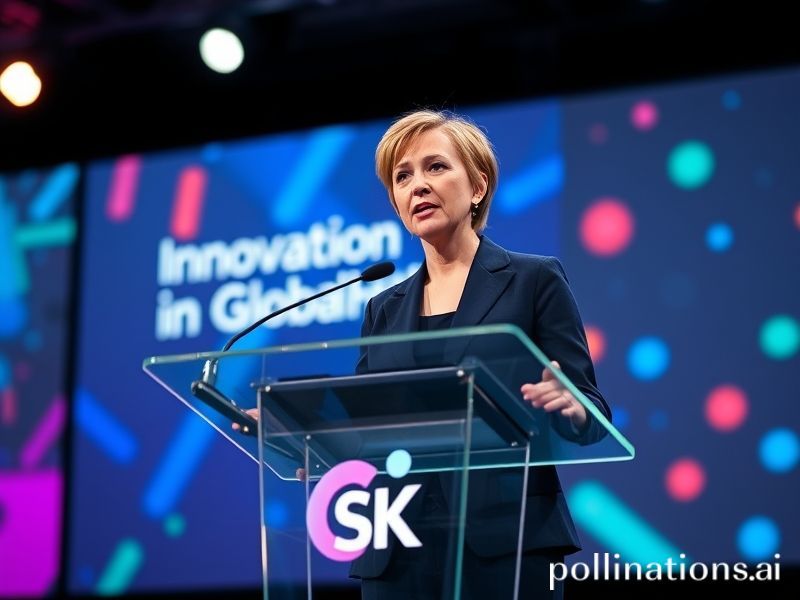Emma Walmsley’s Global Pill Game: How One British CEO Rewrote the Rules of Big Pharma (and Your Medicine Cabinet)
PARIS—On the left bank of the Seine, they are still debating whether Emma Walmsley is a pragmatist in pearls or simply the woman who sold the family silver to Wall Street. Across the Channel, the Daily Mail calls her “the most powerful woman in British business,” which is rather like being crowned the tallest Eiffel Tower in Las Vegas: technically true, geographically surreal. In Beijing, regulators now pronounce her name with the same wary respect once reserved for Marco Polo and opium: she brings goods, she takes profits, she leaves behind the faint smell of shareholder value.
Appointed CEO of GlaxoSmithKline in 2017, Walmsley inherited a pharmaceutical empire that had spent the previous decade treating R&D like an optional side salad. Shareholders were restless. The pipeline was drier than a Saudi golf course. Meanwhile, Pfizer and Moderna were busy re-writing virology textbooks with mRNA footnotes that read like ransom notes to the old guard. Walmsley’s solution? Split the firm in two: one half gets all the vaccines and cancer drugs (the sexy stuff), the other half keeps the toothpaste, vitamins, and a gentle reminder that capitalism always finds a way to monetize your nightly brushing ritual.
Internationally, the move is less corporate choreography and more geopolitical chess. The demerger—completed in July 2022—created Haleon, a consumer-health Frankenstein stitched together from Sensodyne, Panadol, and enough Centrum tablets to pave a medium-sized airport runway. Walmsley kept the biopharma crown jewels under the rechristened GSK, instantly making her the gatekeeper of shingles shots and RSV vaccines in a world that suddenly remembers viruses have passports too. The Chinese government, never shy about reminding multinationals who actually owns the supply chain, nodded politely while quietly moving vaccine production onto faster domestic tracks. In Brussels, officials opened another carton of antitrust paperwork, because nothing says “European unity” like suing the same company in three languages simultaneously.
Yet the real punch line lurks in the global south. While Western capitals applaud Walmsley’s strategic elegance, countries from Kenya to Colombia watch Haleon’s over-the-counter price hikes with the weary expression of people who know that a $6 bottle of Advil costs half a day’s wages. The World Health Organization keeps begging GSK to release its pneumonia vaccine patents; Walmsley counters with tiered-pricing schemes that sound philanthropic until you notice the fine print reads like a credit-card agreement. Somewhere in Geneva, an intern is updating the spreadsheet labeled “Irony of Life-Saving Drugs Sold on Installment Plans.”
Of course, the markets adore her. GSK’s share price has doubled since the split, proving once again that investors prefer a clear story to a complicated cure. Analysts at J.P. Morgan call her “the anti-Big-Pharma CEO,” presumably because she wears minimalist blazers instead of villainous capes. In Davos, she speaks fluent Davosian—sustainability, stakeholder capitalism, and the obligatory slide showing African children smiling at a solar-powered fridge. The audience nods, checks their BlackRock app, and reassures themselves that good intentions compound quarterly.
Meanwhile, the planet keeps coughing. Tuberculosis strains in Mumbai now laugh politely at old antibiotics. Long-COVID clinics in Toronto have waitlists longer than a Russian novel. Walmsley’s labs are working on a universal flu vaccine—an endeavor about as certain as peace in the Middle East, but with better PowerPoint transitions.
And so, the woman who began her career marketing L’Oréal shampoo in Paris now controls whether your grandmother gets her shingles shot before her next cruise. It is either the ultimate corporate fairy-tale or a grim allegory about late-stage capitalism, depending on how recently your insurance denied coverage. Either way, Emma Walmsley keeps climbing, politely stepping over the bodies of expired patents and expired patients alike, wearing the kind of smile that says, “I’ve read the room, and the room prefers dividends to death tolls.”
In the end, perhaps that is the most international lesson of all: every empire—pharmaceutical or otherwise—eventually splits itself into what it can sell and what it can still justify. Walmsley just happened to do it with PowerPoints instead of parliaments. History will judge whether that’s progress or merely the most profitable symptom of a sick world.







